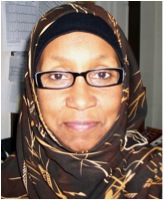 Asiila Imani was raised an “army brat,” the eldest of three of a career army officer. She was born in Kentucky and graduated high school in Hawaii, living in 9 other states in between. On her own, she continued to wander, adding another 5 states to her list. Finally, she married and has lived in Southern CA since 1992. She has two granddaughters via her stepson. She dabbles in reflexology and homeopathy and occasionally works on both ends of life as a doula and midwife, and a bather for ghusl mayyits (bath for the dead).
Asiila Imani was raised an “army brat,” the eldest of three of a career army officer. She was born in Kentucky and graduated high school in Hawaii, living in 9 other states in between. On her own, she continued to wander, adding another 5 states to her list. Finally, she married and has lived in Southern CA since 1992. She has two granddaughters via her stepson. She dabbles in reflexology and homeopathy and occasionally works on both ends of life as a doula and midwife, and a bather for ghusl mayyits (bath for the dead).
An excerpt from Asiila’s story, “Three”:
“Even though I had heard that polygyny always ended in broken hearts, mayhem, and dismemberment, the idea of sharing a husband had never bothered me. I had never understood why women fought so much over men. If a man loved two women, the women could either leave or share him. I believed women should be confident enough in themselves that they wouldn’t need to be the sole object of a man’s affections. I knew there were men who loved and supported two families with equal devotion. To me, husband sharing sounded like the perfect blend of being married and single at the same time. I would have a loving partner to care for me, and time alone to care for myself. In every holy book I’d read, God was clear that love, unlike money, is infinite; it’s a metaphysical commodity that grows when shared. In short, polygyny seemed not an unholy aberration, but a sacrosanct communion between a family and God.
I realized that most other women did not share my philosophy, and I had already decided that I’d never marry a man whose wife did not agree with having a co-wife. Ali said his wife, Hajar, was an exception. He said she was fully aware of our relationship and supported it openly. Learning that eased my worries some, but I still had to hear it from Hajar herself.”
To read the rest of Asiila’s story, order Love InshAllah today!
Why were you drawn to this project?
A male coworker once told me that before he met me he didn’t think Muslim women were human. This anthology, insha’Allah, will help to soften the assumptions regarding American Muslim women, to include how we’ve supposedly given up so much of “our” culture and are thus doomed to dull, asexual lives. I hope the readers will see that although the recipe may be different, we share the same ingredients of joy, heartache, drama, and love.
Secondly, I won’t have to explain, again, the next time a sister asks how I ended up married “like that.” Now, I can refer them to this book!
What was the most challenging part of sharing your story?
How much to share and what tone to use. I didn’t want to make light of some situations that may not be appreciated by the others who were involved. Because of the limited word count, deciding which details to keep and which sidebars and anecdotes to jettison were also difficult.
The absolute hardest part was digging back through my past in order to understand the whys and hows of my choices and the unintended consequences. It was tough to reach in and embrace painful memories and give them voice. But, alhamdulillah, as Allah says, “With every difficulty comes ease,” therefore, writing this piece turned out to be very cathartic.
If there’s one thing you hope that readers will take away from your story, what is it?
Be open to who God sends you. Know yourself before trying to learn another. Know that whatever you envision will NOT be how it turns out, and that’s ok. Believe and sincerely rely on God’s guidance, He knows you better than you do. In other words, don’t make life harder than it has to be.











